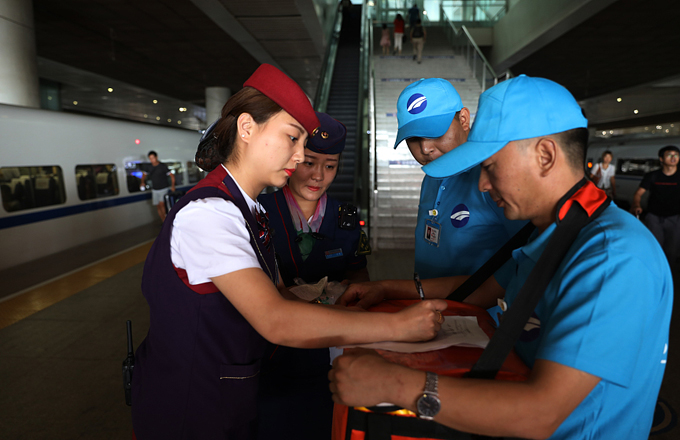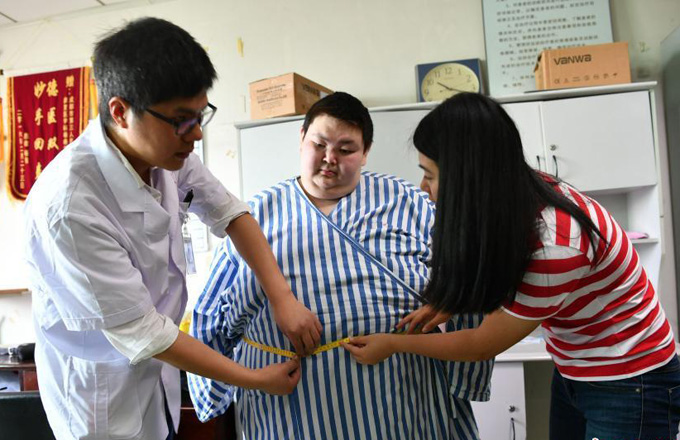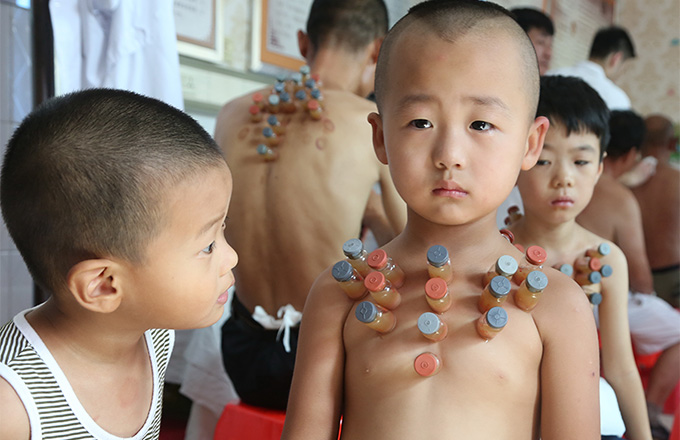

BEIJING - While watching a live broadcast of a science lecture delivered by an astronaut aboard the space module Tiangong-1 Thursday morning, Wang Lutian was drawing a colorful rocket with crayons in his classroom.
"Moon...stars...a rocket to the sky," Wang explained his work in a cheerful voice. The 10-year-old is a mentally disabled student at a special school in downtown Beijing.
Wang and more than 100 other disabled students watched a lecture hosted by China's first teacher in space Wang Yaping, one of the three crew members of the Shenzhou-X spacecraft, which was launched on June 11 and docked with the Tiangong-1 on June 13.
When the three astronauts appeared on the TV screen, the children burst into applause.
Wang lectured about motion in micro-gravity environments and the surface tension of liquid in space, as well as the concepts of weight, mass and Newton's Law, illuminating her speech with various demonstrations.
"Zero gravity!" student Qian Shaohong shouted when he saw astronaut Nie Haisheng making a show of crossing his legs into a meditation posture in mid-air.
The autistic child went on to clearly explain the process of launching a spacecraft to his classmates whiling disassembling a spacecraft model on his desk.
"Some of our students have shown strong interest in space science. They asked me if they could watch the lecture from space several days ago," said Zhang Yini, a teacher at the school.
Scientific knowledge has helped open a window for the children to know about the world, Zhang said.
The lecture also inspired enthusiasm for the universe and science among youngsters living on the "roof of the world."
"I was most impressed by the demonstration of the 'water ball' that illustrated the surface tension of water in a gravity-free environment. It's truly amazing," said Rigzin Jigme Doje, a high school freshman in Lhasa, capital of southwest China's Tibet Autonomous Region.
Describing himself as a lover of physics, Doje said the lecture reinforced his dream of becoming a physicist.
The lecture also prompted other Tibetan schoolchildren to relate the mysterious world of outer space to their hometown.
Some of them raised questions like "can Tibetan caterpillar fungus (a precious traditional medicine) grow in space?" and "will a spacecraft sent from Tibet reach space faster?"
While 60 million students and teachers at 80,000 middle schools across the country watched the lecture on TV, principal Yue Deming and his students at Zhangjiagou Primary School missed out on the experience.
"We can't afford a TV set, let alone high-tech educational devices like telescopes," said Yue, who is also the only teacher at the village school in north China's Hebei Province.
However, the 57-year-old Yue gave his 18 students a simplified "space class" on Thursday morning. "If you had the chance to explore the universe, what would you do first?" he asked.
"The sun in our eyes is as small as a plate. I'm wondering what the Earth we live on looks like from space," said student He Jiayue.
Student Bai Jingyi said she dreams of walking on the moon someday. "My storybook says Chang'e (a fairy maiden from Chinese folklore who flies to the moon) and a cute rabbit live there. I want to play with them." she said.
While the children at Zhangjiazhou Primary School imagined space in their mind, 330 select students at a top Beijing high school were able to interact with Wang through a live video feed system.
The stark contrast in education access between students in rural and urban areas reflects China's uneven development, said Gu Li, a researcher dedicated to primary and secondary school education in east China's Jiangsu Province.
"Basic science education is a must for today's youngsters. But in China it remains a distant dream for disadvantaged children," said Gu, referring to those who migrate with parents, live in poverty or have disabilities.
Wang Lihong, a social worker from a Beijing-based NGO that provides assistance to the migrant population, said many schools for migrant workers' children are in dire need of TV sets, computers and projectors to facilitate teaching.
"Although students there have a strong interest in natural sciences, they have very limited opportunities to feel science in person, rather than learning from textbooks," Wang said.
He urged the government to boost the accessibility of science and technology museums and other learning institutions for disadvantaged children.
"A decade after the first Chinese man was sent into orbit, it's time to turn our attention to the desire for knowledge within our next generation," Gu said.













